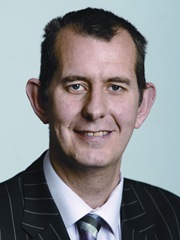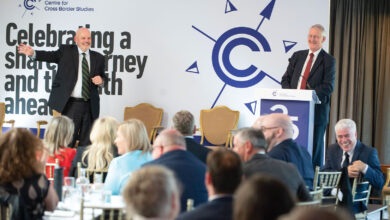Planning for recovery: Edwin Poots
Following a number of high-profile planning controversies, Environment Minister Edwin Poots has outlined his proposals for a reformed, efficient and streamlined planning sector that will contribute to the economic recovery. agendaNi reports.
The planning system needs to be capable of meeting the needs of investors, therefore it must be “flexible, predictable and prompt,” according to Environment Minister Edwin Poots.
Speaking at an agendaNi ‘planning and the economy’ seminar, Poots pointed out that the Executive is “still fully engaged in attracting overseas investment, and stimulating the internal market” and that a reformed planning sector must be able to make “a fundamental contribution” to the region by attracting inward investment, stimulating confidence in business and meeting the needs of the community at large.
“A key issue here is achieving the balance between investment, sustainability and preservation,” Poots told delegates. “In addition to facilitating economic development, the planning system also has to be able to protect our countryside, and ensure generations to come can enjoy our natural environment,” he added.
Sustainable reform
Economic recovery will be “slow and arduous” therefore planning must be sustainable. For example, the Northern Ireland Marine Bill would create an effective marine planning system and would “help support economic recovery through the development of new scientific knowledge … in energy sources such as wind, wave and power.”
Although the Bill will not favour any particular interest, it will provide “real economic opportunities”, he contended.
The DoE is working on the creation of two new planning policy statements. PPS4 will promote sustainable economic growth within urban and rural areas. It is currently being considered by the Executive. In addition, PPS24 will decide the weight to be accorded to the economic aspects of development proposals in the making of planning decisions and will be taken to the Executive “at the earliest opportunity,” Poots said.
The Minister stated his intention to encourage everyone involved in planning to “play their part” because he feels frustrated “when some use the system for their own private ends, and not for the greater good of Northern Ireland.”
Two strategic project teams were introduced to the Planning Service in 2007 to handle large scale investment planning proposals. These teams have sped up decisions by bringing together experts for a pre-application discussion on applications that are set to be of social or economic significance to Northern Ireland.
The Minister noted: “As a result of these more immediate reforms, within the last two years some 90 strategic applications have been processed, amounting to planning approvals representing investment well in excess of £2 billion, plus the associated construction jobs and post-development job creation.”
He added: “In addition to these major strategic applications, since April 2009, a further 34 economically significant applications have also been processed, the majority of which were within six months, including the likes of Bombardier, Randox Laboratories and a number of developments in the Titanic Quarter.”
Another advance has been the streamlined council consultation scheme which operates across all 26 councils, allowing approvals on non-contentious planning applications to be issued by the divisional planning manager without formally bringing them to the planning committee. By the end of the year this scheme will have been extended to a wider range of applications.
“This has been an outstanding success [because] 50 per cent of all applications are being processed and approved on average in just eight weeks,” the Minister reflects. And, the faster planning decisions are having a significant impact on the SME sector. “This is the standard of service that I like to see.”
“Northern Ireland has to be open for business, we need to send out the right messages, and we need to deliver,” the Minister emphasised.
“I am fully committed to securing a modern efficient planning system designed to meet today’s needs and those in the future. For my part, I will bring through the Assembly changes to the planning system, which I trust will meet the needs of all – in particular, the economic benefits that Northern Ireland seeks and deserves.”







